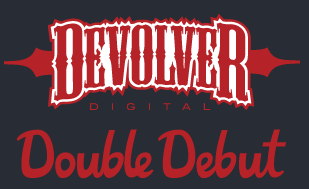
Our partnership with Devolver Digital and Humble Bundle
You may remember that I profiled a new digital distributor last year called Devolver Digital who was adding independent films to their existing line up of video games. Yesterday, Devolver announced a new initiative with the folks at Humble Bundle and VHX to release the “Devolver Digital Double Debut” Bundle, a package that includes five games both classic and new and the new documentary Good Game profiling the professional gaming lives of the world-renown Evil Geniuses clan as well as other films on the VHX platform. Proceeds from the bundle benefit the Brandon Boyer Cancer Treatment Relief Fund as well as The Film Collaborative.
You may remember, we are a registered 501c3 non profit dedicated to helping creators preserve their rights in order to be the main beneficiary of their work. We plan to use our portion of the proceeds to fund the new edition of our book Selling Your Film Without Selling Your Soul which will be given away totally free upon its publication. If you’ve ever benefited from our advice, our speaking or our written posts, now is the opportunity to give us support in expanding even more of your knowledge as well as help Brandon Boyer, chairman of the Independent Games Festival (IGF), to help with his astronomical medical bills for cancer treatment.
You can find the Bundle here https://www.humblebundle.com/
It is just this kind of out of the box thinking we love and we couldn’t wait to be involved.
As a follow up to last year’s piece, I asked Devolver Digital founder, Mike Wilson, to fill me in on how the company has ramped up and what this initiative means to gamers, to filmmakers and to the non profits involved.
In the year since Devolver Digital started, how has your games audience transitioned into an audience for the films you handle?
MW: “When we announced the start the Films branch of Devolver Digital last SXSW, we did so for a few reasons. The first was seeing an opening to create a more publishing-like digital distributor for micro-indies. Curation, promotion, transparency, versus what we perceived as the status quo in the VOD distribution space where films were uploaded in bulk and they hope for the best.
One of the biggest reasons, though, was the knowledge that the biggest games platforms that we do 95% of our (very healthy) digital distribution business with on the games side were going to be moving to start delivering films this year. Those platforms are still not very active in the film space, aside from Games/Movies bundle with Humble Bundle that just kicked off. But they are coming, so we’ll know more about how much we are able to turn the indie game-loving audience onto indie films from the fest circuit a little later this year. Our hopes remain high, as these are people who consume an inordinate amount of digital media, are very comfortable with digital distribution and watching films on their computers, and they have a community around independent content from small teams around the world like nothing we’ve seen on the film side. It’s more akin to music fans, turning friends on to great bands they’ve never heard of, and gaining their own cred for unearthing these gems. THIS is what we hope to finally bring to the independent film space, along with these much more sophisticated platforms in terms of merchandising digital content.”
Where are you seeing the greatest revenues from? Cable VOD, online digital, theatrical? Even if one is a considered a loss leader, such as theatrical typically, does it make sense to keep that window?
MW: “We just started releasing films on cable VOD in the Fall, and most of that content didn’t hit digital until recently, so the jury is still a bit out. We are now able to do day-and-date releasing on all platforms as well. We have done limited theatrical, purely as a PR spend on a couple of our strongest releases, and that has been very successful in terms of getting press the films never would have gotten otherwise, but of course it does cost some money and it’s just an investment in the VOD future of the films. There is still no hope of breaking even on a theatrical run for indies as far as we can tell… but at least the cost to entry has gone down and will hopefully continue to do so. For now, we still expect cable and iTunes to be our best performers, until the games platforms start delivering.”
What lead to this recent initiative through Humble Bundle and VHX? Have you partnered with them before?
MW: “Humble Bundle has been a miraculous success on the indie games side. We do bundles with them as often as possible. The key was getting them and VHX to work together, as we needed a high-quality, low-cost streaming solution to deliver what we expect to be hundreds of thousands of ‘keys’ purchased in these bundles.
VHX is pretty forward thinking on this front, again watching the games platforms carefully, and has come up with an elegant solution that works. We have been asking Humble to let us do a movies bundle for at least six months now, since we’ve had such success with them on the games side. They decided that this games+movies bundle would make for a stronger segue. They have delivered other types of media before such as music, soundtracks, audio books, and comedy records, none of which has had anywhere near the attach rate of their games bundles, but are still quite successful when compared to other digital options for those businesses. We expect films to do better than any of these other ancillary avenues they’ve tried.”
What is the split for all involved? There are several entities sharing in this Pay What You Want scenario, so is this mainly to bring awareness and publicity for all involved or is revenue typically significant?
MW: “In this particular bundle, since all the games and films are roughly $10 values, we’ve split it equally. So you have 10 artists splitting what will probably average out at $5 or $6 bucks a ‘bundle.’ But the volume will be so high, we still expect each of these filmmakers to make more money in these 10 days than they will likely make on their entire iTunes run.
And, TONS of new people watching their movies who would never have found it otherwise, which as a filmmaker, I know counts for as much as the money. I’d personally much rather have my film (and one of the films in the bundle is the last one I produced) in a bundle like this than shoveled onto subscription based VOD, and I know it’ll make more money and get more views.” [editor’s note: Those purchasing the bundle get to choose how the contribution is split between Devolver, Humble Bundle and the charitable contributions.]
Why did you decide to include a donation aspect to the Bundle? Is that an incentive to pay a higher price for the bundle?
MW: “Humble is committed to supporting charities with their platform. It’s part of the magic (other than the tremendous value) that makes their 4 million + regular customers feel really good about taking their chances on games (and other media) they’ve never heard of.
From Devolver’s standpoint, our last weekly games bundle on Humble resulted in nearly $150k for charity in addition to our developers all making a nice payday. It’s a miracle of a win-win-win. In this case, hopefully a lot of filmmakers will feel compelled to try this method out since it’s new, an incredible value, and will support TFC, who have helped so many filmmakers learn to navigate these murky waters. And there’s a very local, very specific cause on the games side, helping a champion of Indie Games like Brandon Boyer overcome his devastating personal situation of fighting cancer while battling mounting medical bills. It just feels good, and this is a big reason Devolver is such a fan of Humble Bundle.”
We can’t think of a better situation than contributing money to receive fantastic games and films while helping those who enable the creators to reach new audiences, keep rights control of their work and celebrate their creativity. Check out the Devolver Digital Double Debut on the Humble Bundle site. We thank Devolver, Humble Bundle and VHX for allowing us to partner with them on this initiative.
Sheri Candler March 7th, 2014
Posted In: Digital Distribution, Distribution
Tags: Brandon Boyer, cancer, Devolver Digital, Devolver Digital Double Debut, documentary, Evil Geniuses, Good Game, Humble Bundle, independent film, Independent Games Festival, iTunes, Mike Wilson, non profit, Selling Your Film Without Selling Your Soul, Sheri Candler, The Film Collaborative, theatrical distribution, VHX, video games, VOD
The harsh realities of becoming a *responsible* filmmaker
by Orly Ravid
It is difficult to definitively explain what The Film Collaborative (TFC) does in a few sentences. Often, when asked for a company bio for a speaking engagement, we are asked to sum up in a few words, but here is the thing…we do different things for different films and that is what makes this non profit company devoted to independent film distribution different. We are a membership organization and we offer a menu of services that are separately available. For our members, we are largely an educational and informational organization. We will work with any film/filmmaker to provide consultation and educational resources which are included in our membership fees.
We can provide services such as: worldwide festival distribution, worldwide sales, domestic sales, worldwide direct digital, domestic theatrical, limited domestic educational distribution, grassroots / social network marketing services, and contract negotiation services. These are all subject to additional fees so the filmmaker must have significant budget to allow for the labor and expenses incurred and our acceptance depends on the workload currently undertaken by the company.
We also serve in a sales agent capacity with SOME films. Due to this dual nature (educational and service oriented), we are very discerning about the films we take on in this capacity. We can work on any aspect of distribution, but with a strong emphasis on direct distribution being part of your overall distribution strategy. We can connect you with service providers/buyers we think are right for your film, and ones we trust and recommend, but WE NEVER OWN YOUR RIGHTS and filmmakers can cancel the service at any time. This clearly sets us apart from other sales agents and can be confusing to those who are accustomed to typical sales agent arrangements. The deals we make are almost always between the buyer and the filmmaker. The only exception to this are bulk deals whereby doing the deals individually is just tortuous for all involved. We are very boutique in our sales agent offerings, not wanting to disappoint or take on more than we can handle. If we don’t think a title is suited to our strengths and our mission to offer quality films of artistic merit with strong distribution potential, then we don’t take them on for sales representation. Which brings us to merit…
Not all films will have distribution potential, not all films are good, not all films have an audience, or not a significant one. There, we said it! Time and again we see filmmakers willingly, enthusiastically going into debt, either raising money from investors or credit cards and coming to us for help in getting their creations out into the world. Sometimes those creations just won’t have a life out there and no matter what is spent in time or money, a significant audience won’t be found. We drill down into every member’s film in order to give the best assessment, but there are times when the prognosis is not favorable to the kind of success they are seeking.
For members’ films, we remove our personal tastes from the equation and try our best to determine WHO in the world would be enthusiastic for the film and how many such folks are out there? And where are they? And can they be reached given the resources available? When you made the film, were you thinking of an audience? When you came to us expecting the film to: get TV sales, international sales, a nice Netflix fee, a theatrical release, a theatrical even after you did a DIY DVD and iTunes release, were you basing that on another film that is similar? Do you understand the decision making process involved in the buying of films for release? Was any research at all conducted BEFORE the production started? With the amount of information on our site and thousands of others online, there is no longer an excuse for not knowing the answers to these questions well before a production starts.
I am starting to want to be the tough love nursemaid and say we don’t want your babies to be orphans. Filmmakers now have to educate themselves a bit before conception and well before giving birth so they will be able to cover all the rearing their film baby is going to need to claw its way through the mobs of other film babies, their TV siblings, Webcontent cousins, and the rest of their multimedia distraction family. As with conceiving real babies, it is all fun and games until the reality of raising a child sets in. You need to be fully prepared for the long haul.
We have information, we keep up with the current shifting sands of distribution, we receive opportunities because we represent quality films, we have contacts, years of expertise, we’re friendly, we’re not gonna f*ck you over, but we cannot save every film from oblivion nor can we convert every film into a success however you define it. So much of that has to start with you, being clear and honest with yourself, before you say “action”.
photo credit: Adam Foster | Codefor
Orly Ravid August 8th, 2012
Posted In: Digital Distribution, Distribution, International Sales, Marketing
Tags: artistic merit, consultation, Digital Distribution, direct distribution, educational resources, festival distribution, film distribution, film sales, independent film, non profit, sales agent, TFC
Introducing TFC’s new fiscal sponsorship program
The Film Collaborative recently started a fiscal sponsorship program to help filmmakers get access to funds they would not be able to obtain without 501c(3) status. The program is now fully up and running, headed by Lynnette Gryseels, former Fiscal Sponsorship Director at Film Arts Foundation in San Francisco. We have been getting lots of questions from interested filmmakers so here are the answers to many of them. There is also a lot of information available on our website.
What is fiscal sponsorship and how does it benefit artists?
Fiscal Sponsorship is used primarily when a non-profit film/video project or event wants to secure funding from private, foundation, government or corporate sources that give only to nonprofit organizations with IRS tax-exempt status. To be considered exempt, an organization must hold a current 501(c)(3) certificate from the IRS.
What are the benefits to the filmmaker that they couldn’t do on their own?
Many funding opportunities are not available without tax exempt 501(c)(3) status
What does TFC look for in projects to grant fiscal representation?
Projects must be consistent with the Film Collaborative’s charitable purposes. This means that any project you are proposing must be noncommercial and represent an imaginative contribution to the film or video art form. Project can NOT be a “work for hire.” Once that criteria is met, we look for projects that are well thought out and have a good chance of getting funding and being completed. Prior filmmaking experience is helpful or if you are new, it helps to have a production team of experienced people; an advisory board with experience mentors is helpful as well and will help make up for a lack of experience with new filmmakers. A polished proposal is essential. Send us your best effort following the directions and if your project looks promising, we will help guide you to develop your proposal further.
If I apply, am I guaranteed to get accepted?
No. The Film Collaborative is not obliged to supply fiscal sponsorship. We will sponsor projects that are in alignment with the TFC mission and have strong, fundable applications. When we agree to become your fiscal sponsor, we are allowing you to use the TFC name to show support for your film. Therefore, we will only approve a project when the proposal is ready to be submitted to funders.
Is it only for US citizens or those operating within the US?
You do not need to live in the United States or be a citizen to apply for fiscal sponsorship. As long as one of your project’s named project directors has Social Security Number (SSN), Employer Identification Number (EIN), Independent Taxpayer Identification Number (ITIN) or other type of IRS registration. See the IRS for more information on obtaining the correct tax registration for non-residents.
Does one have to be a member of TFC to apply?
Yes. Applicants need to be a TFC member at the minimum Contributor level. See http://www.thefilmcollaborative.org/join.html to sign up.
How does one qualify?
To qualify, you must have
-A film project; documentary, narrative or short in any stage of production;
-You must join the Film Collaborative at the Contributor level or higher;
-Your project must be consistent with the Film Collaborative charitable purposes, is noncommercial and/or educational and represents an imaginative contribution to the film or video art form;
-The project may not be “work for hire”;
-You must be seeking donations in the form of grants from public agencies, foundations, corporations, or individual donors including fundraising benefits.
What is the submission process?
1. Join The Film Collaborative;
2. Pay the $35 fiscal sponsorship application fee;
3. Fill out and submit the online application form, and upload a PDF of your project proposal.
The application you submit to the Film Collaborative will also serve as a blueprint that you will use to secure funding by applying for grants or present to prospective contributors. Our goal is to help you build the best possible proposal in order to go forward and successfully raise the necessary funds to realize your project. Therefore, we accept projects with proposals that are ready to go.
What is the submission deadline?
There are no submission deadlines. Applications are open.
After I receive backing from TFC, what happens?
Once accepted, we will send you a copy of the Fiscal Sponsorship contract, a W9 form, a welcome package which includes a fiscal sponsorship support letter, tax ID number, a copy of your signed contract and information on how to set up online donations. Donors to your project can contribute online using a credit card or write checks to the Film Collaborative. Donations will be disbursed at the end of each month.
Once your project is accepted you can now apply for funds from public agencies, foundations, corporations, or individual donors. TFC will provide you with the necessary documentation to show that your project is fiscally sponsored.
Can I apply to the NEA, NEH, NSF or other government agencies?
The Film Collaborative cannot submit applications on filmmakers’ behalf to the National Endowment for the Arts (NEA), National Endowment for the Humanities (NEH) and National Science Foundation (NSF). Ask us about all other government agencies.
What are the administrative fees involved and what do they pay for?
Applicants must join the TFC and pay a $35 non-refundable application fee. After that TFC takes 5% of funds donated to your project. These fees pay for overhead such as staff time processing applications and donations.
Is there a reporting process?
Yes. You must report to TFC twice a year on all funds received for your project, monies spent and any significant budget changes. Failure to comply with the reporting process will result in project termination.
Does TFC provide advice on contacting donors and soliciting funding?
We can provide some advice and answer questions. You are responsible for applying for your own funds and sourcing your own donors.
Is there a difference between this service and others like Fractured Atlas?
Yes. TFC only sponsors film projects, Fractured Atlas sponsors many other types of projects in addition to film. The 5% TFC fee is the lowest of any known film project fiscal sponsor.
How long does the fiscal sponsorship stay active?
Your fiscal sponsorship will remain active as long as your reports to the TFC are up to date and you are still working on your film. Projects that fall behind on reports will be terminated and will require a fee to reinstate. Any funds donated to a dormant or terminated project cannot be dispersed until the project reporting is brought up to date.
Is the TFC fiscal sponsorship program exclusive?
Yes and no. Your project can have another fiscal sponsor that is not a film project fiscal sponsor, for example, a community organization or something related to your project is fine.
Can name changes or change of control happen under the sponsorship?
Yes, on a case by case basis, depending on the change required. Please ask.
Can I change my project or have more than one project entered into the program?
Depending on the nature of the change it may be considered a new project. Multiple projects by one filmmaker are possible.
What is your background with fiscal sponsorship/grant funding applications?
The TFC fiscal sponsorship program is headed by the former director of fiscal sponsorship at the Film Arts Foundation in San Francisco. We are used to reviewing proposals, have relationships with funders and can advise you on creating an attractive funding application.
Lynnette is passionate about film and helping filmmakers tell thought-provoking stories that entertain, assist social change and support their filmmaking aspirations. She has over 15 years experience working with independent filmmakers, non-profit film organizations and several local and international film festivals. She has previously assisted filmmakers in learning their craft through educational program development and project development support. At Film Arts Foundation in San Francisco Lynnette headed the Fiscal Sponsorship and Grants Program, one of the oldest fiscal sponsorship programs in the country. She brings a depth of knowledge from this experience to her role as head of TFC’s fiscal sponsorship program.
Orly Ravid July 3rd, 2012
Posted In: fiscal sponsorship
Tags: 501c3, charitable contribution, documentary, donors, financial reporting, fiscal sponsorship, Fractured Atlas, grants, independent film, Lynnette Gryseels, non profit, noncommercial, private funding, tax exempt, The Film Collaborative




